In 2025, privacy-compliant analytics tools are critical for businesses to collect data ethically while adhering to regulations like GDPR and CCPA. These tools avoid storing personal information, respect user consent, and minimize data collection risks. The article highlights seven tools that balance privacy and actionable insights:
- Ketch: Focuses on consent management and automated compliance with flexible integrations. Starting at $150/month.
- Microsoft Purview Compliance Manager: Offers centralized compliance management with pre-built assessments. Included with Microsoft 365 E5.
- Amazon Macie: Automates sensitive data discovery within AWS environments. Costs $1.00 per GB processed.
- Securiti AI: Automates privacy operations with AI-driven tools for data mapping and rights management. Custom pricing.
- DataGrail: Simplifies compliance with over 2,000 integrations and automated data subject request handling. Custom pricing.
- Osano: Handles cookie management and consent tracking, backed by a $500,000 compliance guarantee. Starts at $199/month.
- OneTrust: Scales privacy management for enterprises with extensive integrations and consent tools. Pricing begins at $827/month.
Privacy compliance isn’t just about avoiding fines – it builds trust and ensures long-term business success. With 75% of the global population expected to be under privacy regulations, investing in these tools is a smart move.
Quick Comparison
| Tool | Compliance Coverage | Consent Management | Key Integrations | Starting Price |
|---|---|---|---|---|
| Ketch | GDPR, CCPA | Built-in consent tracking | Salesforce, HubSpot, Adobe | $150/month |
| Microsoft Purview | GDPR, CCPA, HIPAA, SOX | Basic consent tracking | Microsoft 365, Azure, Power BI | Included in E5 Plan |
| Amazon Macie | GDPR, CCPA, HIPAA | – | AWS services, S3, CloudTrail | $1/GB processed |
| Securiti AI | GDPR, CCPA, LGPD, PIPEDA | Advanced consent orchestration | Snowflake, Databricks | Custom pricing |
| DataGrail | GDPR, CCPA, LGPD | Consent preference management | Slack, Salesforce, Jira | Custom pricing |
| Osano | GDPR, CCPA, LGPD | Cookie consent management | Google Tag Manager, WordPress | $199/month |
| OneTrust | GDPR, CCPA, LGPD, PIPEDA | Universal consent platform | Extensive third-party support | $827/month |
Each tool offers unique features tailored to different business needs. Choose based on compliance requirements, integration compatibility, and budget.
The top GDPR-compliant analytics tools
What to Look for in Privacy-Compliant Analytics Tools
When selecting privacy-compliant analytics tools, focus on minimizing risks while maintaining user trust and protecting your organization’s reputation.
GDPR and CCPA Compliance
Start by ensuring the tools explicitly comply with GDPR and CCPA regulations. Many tools now adapt their processes based on a visitor’s location to meet specific legal requirements. Without this foundational compliance, your business could face regulatory scrutiny and damage to its credibility.
User Consent Tracking
Managing user consent effectively is a cornerstone of privacy compliance. The best tools oversee the entire consent lifecycle – from obtaining explicit consent to enforcing it. According to a 2024 Cisco survey, 75% of consumers avoid businesses they don’t trust with their data. This statistic underscores how critical it is to have a robust consent management system in place.
Opt for tools that provide users with more than just a binary "accept or reject" option. Instead, look for solutions that allow users to customize their consent preferences, such as agreeing to certain types of data collection while declining others. This granular control not only builds trust but also enables you to gather meaningful insights without compromising user comfort.
Data Minimization Features
A privacy-compliant tool should only collect the data you truly need. Focus on tools that gather essential metrics like page views, session durations, and device types while steering clear of personally identifiable information (PII). This approach reduces risk and aligns with privacy principles.
Handling Data Subject Requests
Compliance with GDPR and CCPA includes honoring user rights, such as access, correction, and deletion requests. Tools that automate these processes save time and ensure compliance, which is especially critical as more U.S. states adopt privacy regulations.
Seamless Integration
The ability to integrate with your existing systems is another key consideration. Tools with robust APIs and pre-built integrations for platforms like content management systems, e-commerce solutions, and marketing tools ensure consistent privacy compliance across all digital touchpoints. This also supports an effective consent strategy across platforms.
Consent Strategy and Its Impact
How a tool handles consent can significantly affect both user experience and data quality. Consider the following approaches:
| Feature | High-Control Consent Strategy | Low-Friction Consent Strategy | Hybrid Consent Strategy |
|---|---|---|---|
| User experience | Offers granular choices, which may slow the user journey but builds trust. | Simplifies the process to minimize disruption, though users may feel less control over their data. | Adapts based on user location, showing compliance efforts while balancing experience. |
| Data collection | Provides smaller, high-quality datasets tailored to specific purposes. | Yields larger datasets but may include less accurate or relevant information. | Balances data collection within legal limits, varying by region and often requiring a strong consent management platform (CMP). |
| Marketing performance | Higher engagement from users who actively opt in, leading to better conversions. | Larger audience reach but potentially lower engagement due to less targeted data. | Balances reach and compliance, enabling region-specific marketing strategies with careful segmentation. |
Tools that automatically manage consent expiry and enforce changes when users update their preferences are essential for maintaining compliance and trust.
Audit Trails and Reporting
Strong compliance tools include detailed audit trails and reporting features. These tools document consent and data processing activities, making it easier to respond to regulatory inquiries and demonstrate compliance during reviews.
Data Retention and Deletion Policies
Finally, evaluate how the tool handles data retention and deletion. Look for configurable retention periods and automated deletion of expired data. This minimizes your data footprint while ensuring you retain only what is necessary for legitimate business purposes.
1. Ketch
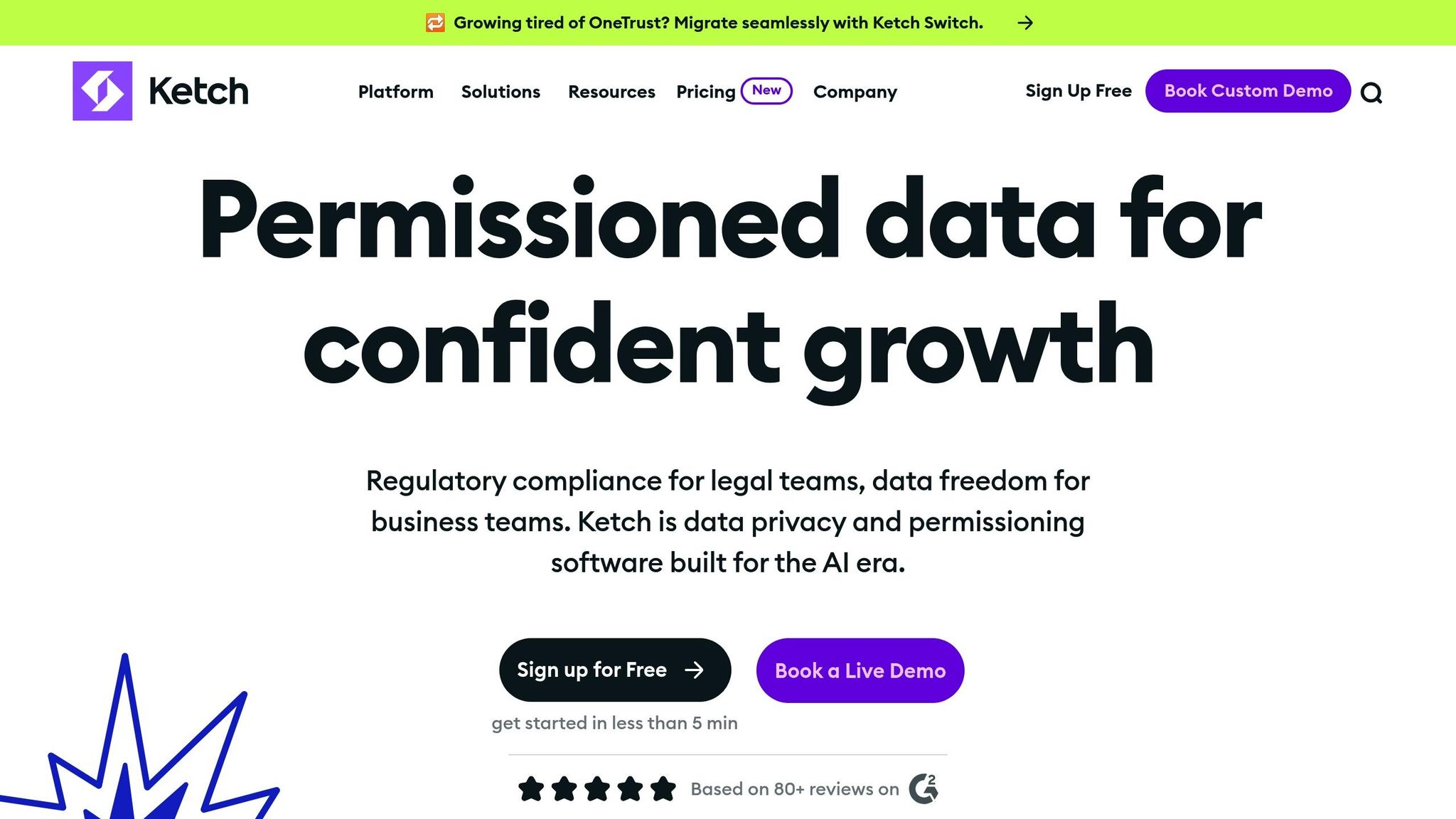
Ketch is a privacy-focused platform designed to seamlessly integrate compliance into your data systems. It uses permit tagging to ensure that every piece of collected data is labeled with specific permissions, dictating exactly how it can be used. This proactive approach embeds privacy into the core of your data infrastructure, rather than treating it as an afterthought.
GDPR and CCPA Compliance
Ketch provides a SaaS platform that helps businesses establish broad data handling policies without the need to rewrite code every time regulations change. For example, in 2023, Prestige Consumer Healthcare (PCH) faced a 56% drop in site traffic. After adopting Ketch’s location-aware notices, they saw a 46% traffic recovery.
"Modern privacy tools like Ketch enable you to achieve growth with data while ensuring privacy compliance." – Chief Privacy Officer, PCH brand agency partner
The platform automatically updates policy changes across all connected systems, ensuring your organization stays compliant without disruptions. This built-in compliance framework also supports robust consent tracking.
User Consent Tracking and Audit Logs
Ketch excels in managing user consent with identity-aware tools that link users across devices, ensuring compliance tailored to their location. Its native identity resolution feature tracks users across multiple channels, delivering personalized privacy settings based on their preferences.
SeatGeek leveraged this capability when expanding into Europe in 2024. By partnering with Ketch, they implemented a location-aware consent system that ensured GDPR compliance while preparing for future regulations like CPRA.
"We needed a fast, easy-to-deploy privacy solution, and Ketch delivered on that promise. Onboarding was straightforward thanks to their qualified, hands-on customer experience team." – Tim Janas, Senior Corporate Counsel at SeatGeek
For businesses navigating GDPR and CCPA requirements, Ketch also provides pre-built compliance templates.
Data Minimization and Anonymization
Ketch simplifies data minimization by tagging each piece of information with explicit permits, ensuring only the necessary data is collected. This setup allows for automated compliance and gives users the flexibility to modify or withdraw permissions as needed.
The platform embeds compliance metadata directly into your data, ensuring that privacy preferences remain intact as information flows through your systems or to external partners. This approach eliminates the risk of data being used outside its intended scope.
Integration with Tech Stacks
Ketch integrates seamlessly with major platforms like Adobe, Google Analytics, and Salesforce. Its automated data mapping feature provides real-time insights into your data flow, making it easier to manage and understand how information moves across your systems.
Pricing begins with a Free plan for up to 5,000 monthly visitors, with paid plans starting at $150 per month. This tiered model ensures that businesses of all sizes can access privacy compliance tools, while larger organizations benefit from advanced, enterprise-level features.
2. Microsoft Purview Compliance Manager
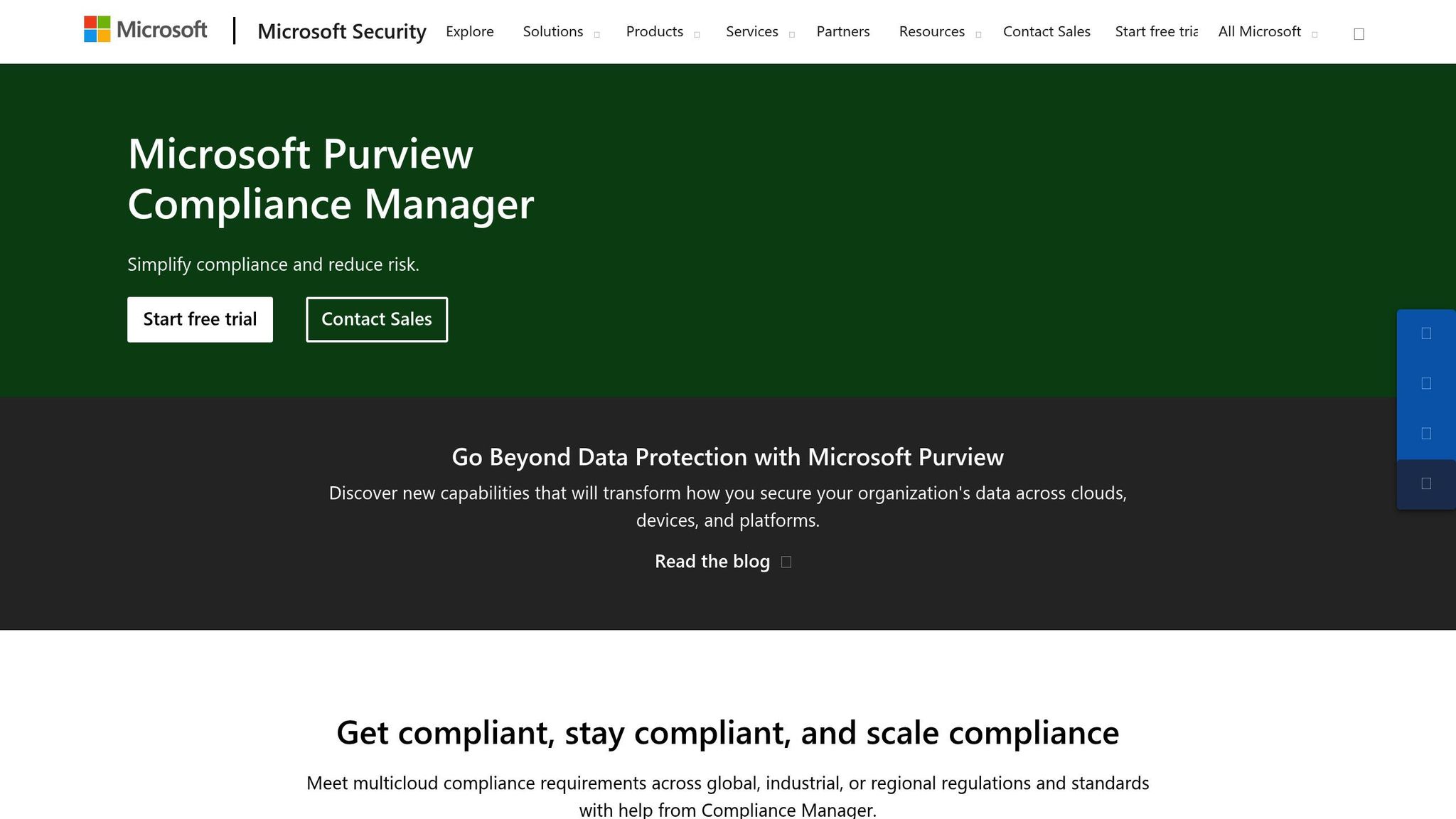
Microsoft Purview Compliance Manager is a powerful tool designed to simplify privacy compliance across multicloud environments. It shifts compliance efforts from being reactive to proactive by offering centralized oversight and management.
With more than 360 regulatory templates, the platform allows businesses to quickly generate assessments tailored to various jurisdictions. Its standout features, including robust GDPR tools and advanced audit capabilities, make it an essential resource for organizations navigating complex compliance landscapes.
GDPR Compliance
Microsoft Purview Compliance Manager provides specific tools to address GDPR requirements, particularly for Enterprise E5 customers. The platform includes pre-built assessments, step-by-step guidance for improvement actions, and tools to handle critical Data Subject Requests (DSRs). These requests cover key areas like data discovery, access, rectification, restriction, export, and deletion of personal data. It also supports breach notification requirements and helps organizations prepare Data Protection Impact Assessments (DPIAs), as required by GDPR.
One of its standout features is the risk-based compliance score, which helps organizations prioritize their compliance efforts. This score is calculated based on completed improvement actions, with each action weighted according to the potential risks involved. This scoring system ensures organizations can focus their resources where they are needed the most.
User Consent Tracking and Audit Logs
Beyond GDPR, the platform offers comprehensive tracking and auditing features. Its unified audit log system captures thousands of operations across Microsoft services and solutions, providing detailed records of activity. These logs are searchable by security teams, IT administrators, insider risk teams, and compliance investigators, ensuring transparency and accountability.
Audit functionality is enabled by default for organizations with eligible subscriptions, ensuring continuous monitoring without requiring additional setup. This automated system captures and stores audit records, offering a detailed trail that can be used to demonstrate compliance during regulatory reviews. Additionally, improvement actions can be assigned to specific users within the organization, allowing teams to store evidence, notes, and status updates directly in the platform. This centralized approach enhances accountability and ensures thorough documentation of compliance efforts.
Integration with Tech Stacks
Microsoft Purview Compliance Manager is designed to work seamlessly across diverse technology environments, making it ideal for managing compliance in multicloud setups. Its workflow capabilities enable organizations to conduct efficient risk assessments within a single platform.
The platform supports both pre-built assessments for common industry standards and custom assessments tailored to unique compliance needs. This flexibility allows organizations to align the tool with their existing processes while addressing specialized regulatory requirements.
3. Amazon Macie
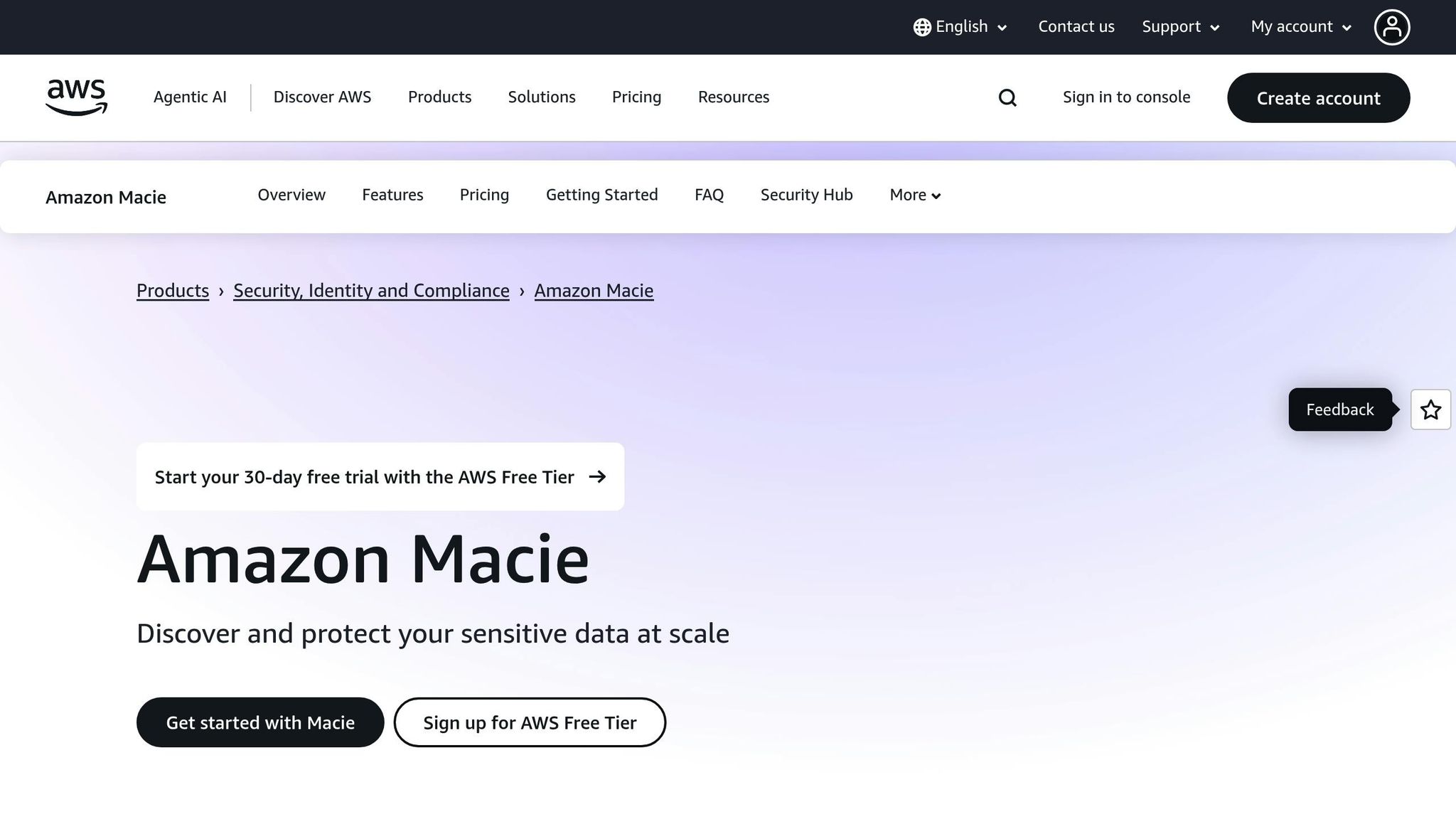
Amazon Macie is a managed service designed to safeguard data privacy and security within AWS environments. By leveraging machine learning and pattern matching, it identifies and protects sensitive information, particularly personal data, across Amazon S3 buckets. It automates the discovery of sensitive data, helping organizations scale their efforts while keeping data protection costs in check. Macie also provides detailed insights into Amazon S3 buckets, flagging unencrypted, publicly accessible, or shared buckets. Its advanced analytics notify users about sensitive data across their AWS infrastructure.
GDPR and CCPA Compliance
Macie plays a pivotal role in helping organizations adhere to GDPR and CCPA regulations. It identifies, classifies, and protects sensitive data stored in AWS, ensuring compliance with these privacy laws. For example, under CCPA, consumers have the right to opt out of having their data sold or shared. Macie addresses this by offering complete visibility into consumer data storage, enabling quick responses to such requests.
The platform also allows for tailored compliance through its custom data identifiers, which let organizations define specific data patterns for more targeted monitoring.
Data Minimization and Anonymization
Macie aligns with data minimization principles outlined in privacy laws like GDPR. Its automated sensitive data discovery jobs help organizations pinpoint only the data they need to protect. To reduce false positives, users can configure allow lists, specifying patterns or text that Macie should ignore during its analysis. Additionally, sensitive information in log events is automatically replaced with asterisks, following established policies.
These privacy-focused features integrate seamlessly within the broader AWS ecosystem, offering a streamlined approach to data protection.
Integration with Tech Stacks
Amazon Macie integrates effortlessly with Amazon EventBridge and AWS Security Hub, enabling organizations to monitor, process, and address findings within their existing security workflows. This integration supports near real-time monitoring and ensures findings can be acted upon immediately.
For developers, the Amazon Macie API provides programmatic access to Macie’s settings and data. AWS offers libraries and sample code in multiple languages, including PowerShell, Java, Go, Python, C++, and .NET. This flexibility allows organizations to retrieve findings, pass data to other tools for analysis or reporting, and even automate responses. For instance, Lambda functions can be deployed to enforce deny-all S3 bucket policies for buckets containing sensitive data.
4. Securiti AI
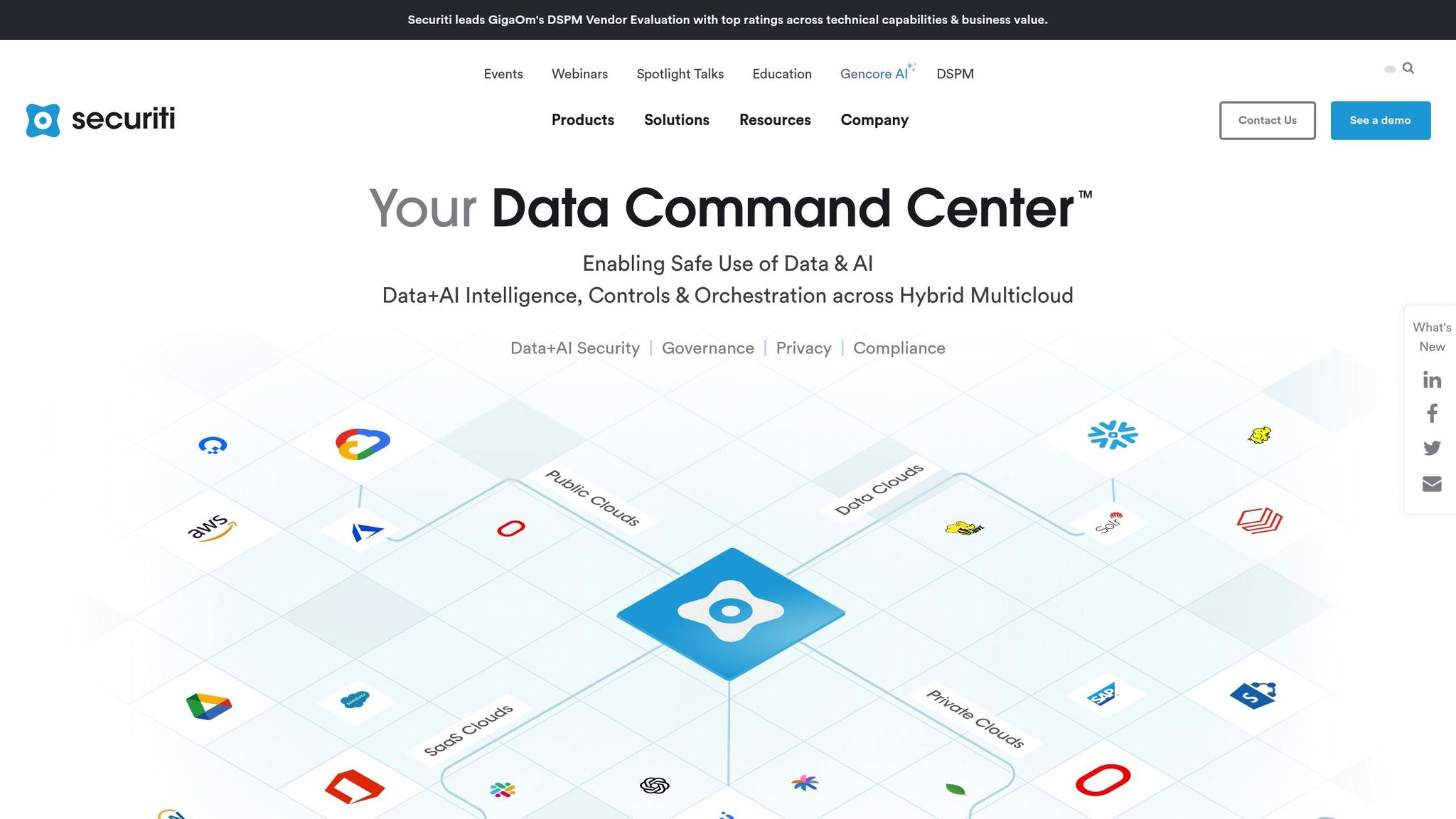
Securiti AI is a PrivacyOps platform designed to simplify and automate data privacy operations while ensuring compliance with privacy regulations. Recognized as a leader in the privacy management market, this platform helps businesses navigate the complexities of enterprise environments by reducing the need for manual privacy management tasks through automation.
GDPR and CCPA Compliance
Securiti AI supports compliance with regulations like GDPR and CCPA by automating critical processes such as data mapping and rights management. This includes handling consent, managing data subject rights, and enhancing consumer transparency.
User Consent Tracking and Audit Logs
To help organizations stay on top of user consent, Securiti AI provides a reporting dashboard and a consent workbench. These tools allow businesses to track and manage user consent across multiple channels. Additionally, the platform generates comprehensive audit trails, linking user actions with timestamps and change logs, which are invaluable for investigations and compliance monitoring.
Integration with Tech Stacks
Securiti AI integrates effortlessly with a variety of enterprise tools and platforms, including major cloud providers, AI systems, vector storage solutions, and services like Microsoft 365, Google Workspace, Box, and GitHub. Its capabilities have earned it high ratings in GigaOm’s DSPM Vendor Evaluation, further solidifying its position as a key player in simplifying privacy operations for complex organizational structures.
sbb-itb-880d5b6
5. DataGrail
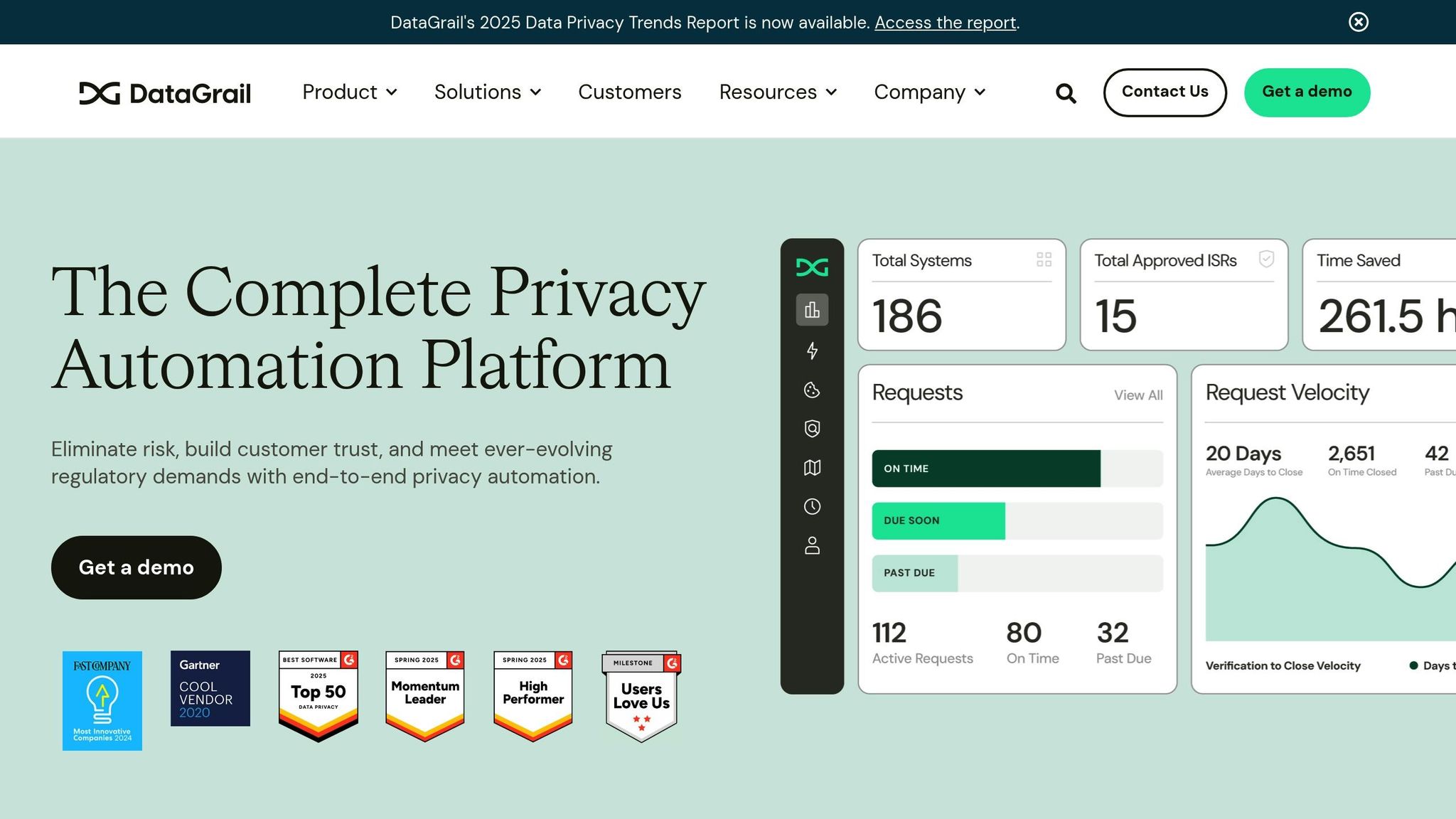
DataGrail simplifies data compliance by automating processes across your tech stack, offering over 2,000 pre-built integrations to ensure smooth operations and compliance with GDPR and CCPA regulations.
GDPR and CCPA Compliance
DataGrail provides a centralized hub for managing data compliance efforts across an organization. Its Live Data Map™ tracks the flow of data between internal and external systems, helping businesses maintain the Records of Processing Activities (RoPA) required under GDPR. It also integrates seamlessly with audit trails and consent tracking workflows, making compliance management more efficient and transparent.
"DataGrail upholds trust in managing personal data of our prospective customers… This is really an era that calls for the kind of functionality DataGrail is providing." – Timothy McIntyre, Associate General Counsel & Data Protection Officer
User Consent Tracking and Audit Logs
DataGrail goes beyond automation with its robust consent management features. It keeps detailed audit logs of user consent changes, meeting GDPR requirements. Privacy administrators can easily access comprehensive consent records, and the platform also offers programmatic API access for custom reporting needs. According to G2 reviews, 90% of users are satisfied with its reporting and logs functionality, while 88% appreciate the audit trails feature for their reliability and ease of use.
Integration with Tech Stacks
One of DataGrail’s standout features is its ability to integrate with popular enterprise tools, automatically mapping personal data across systems. It can even detect downstream applications hidden within complex ecosystems like Salesforce, a task that manual data mapping often fails to accomplish – missing up to 50% of applications storing sensitive data. This extensive integration network ensures that businesses can maintain compliance without the headaches of manual processes.
"One of the things that stood out about DataGrail specifically was the number of integrations that it had with a number of the SaaS providers that we used internally. And so that was an easy sell for us." – Matt Hillary, CISO
Companies like Bed Bath & Beyond have seen substantial benefits from using DataGrail. Brandon Greenwood, the company’s CISO, highlighted how the platform reduced risk and strengthened customer trust, delivering a 10x return on investment. Similarly, Revolve’s General Counsel, Jodi Chapin, noted that DataGrail has saved significant time and technical resources while ensuring compliance. The platform enjoys a 4.7/5 star rating on G2 from 182 reviews, with users praising its intuitive design, seamless integrations, and ease of use. Additionally, its support team has earned a 99% satisfaction rate, reflecting their dedication to customer success.
6. Osano
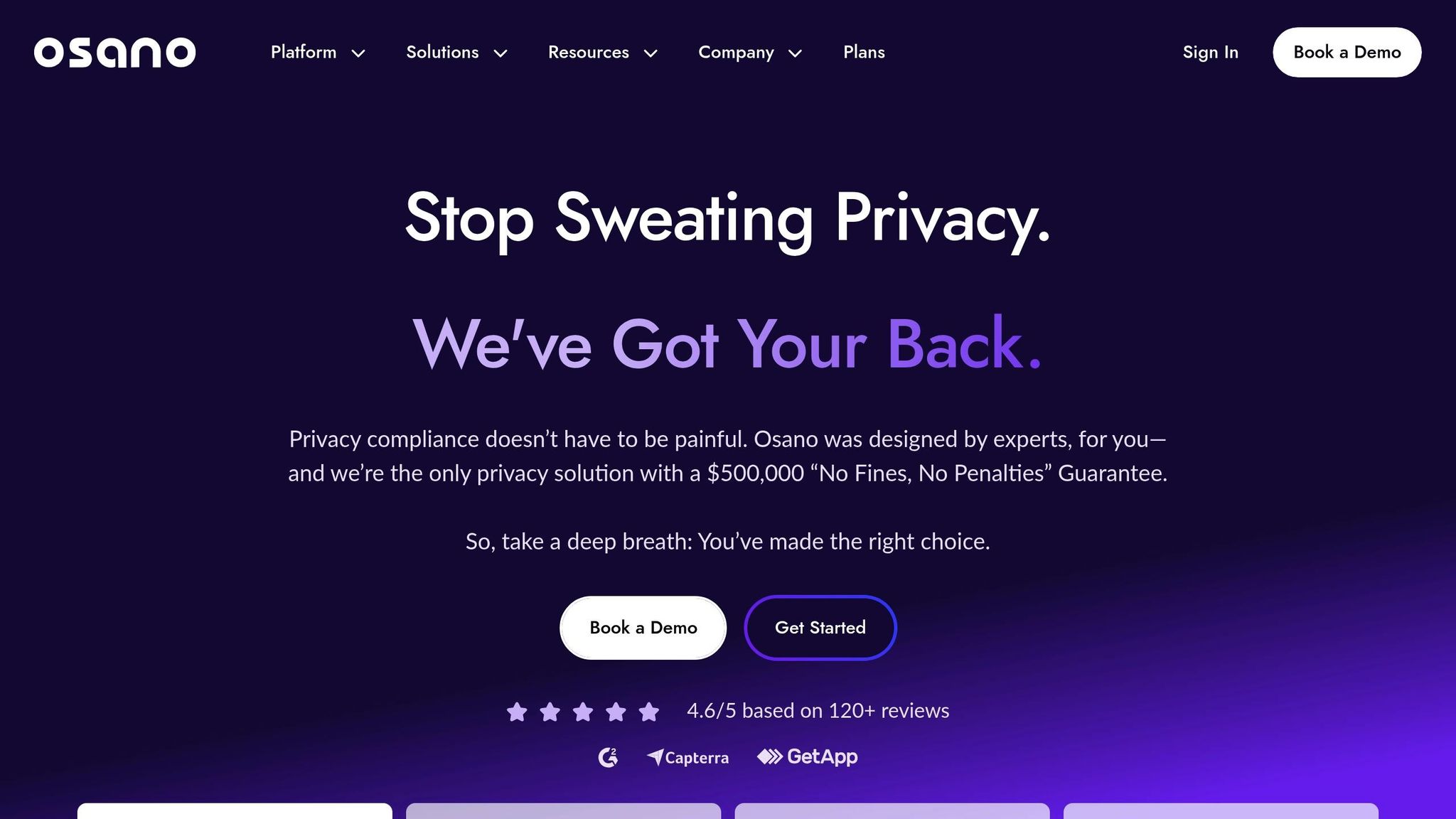
Osano is a privacy compliance platform that processes over 1 billion consents every month. It stands out with its $500,000 "No Fines, No Penalties" Guarantee – the only privacy solution offering this type of assurance. This bold promise reflects Osano’s confidence in its ability to automate privacy compliance across various jurisdictions and regulations. Here’s a closer look at its compliance features, consent management tools, and integration capabilities.
GDPR and CCPA Compliance
Osano simplifies compliance with major data privacy laws like GDPR and CCPA by managing personal data processing and keeping detailed consent records. The platform automatically updates to reflect regulatory changes, ensuring businesses stay compliant without constant manual intervention. It also supports international privacy laws, including Brazil’s LGPD and Canada’s PIPEDA. Automated scans detect cookies, scripts, and iframes, while GDPR-compliant consent mechanisms ensure proper data handling. Built-in templates and safeguards help prevent dark patterns and reduce the likelihood of human error.
Businesses using Osano report saving between $5,000 and $20,000 per jurisdiction on legal fees for outside counsel.
"We’re confident Osano can keep you compliant and want you to be confident, too. If you manage consent according to product and privacy best practices and get fined, we’ll pay." – Osano
Osano’s automation and cost-saving potential make it a modern solution for privacy compliance.
User Consent Tracking and Audit Logs
Osano’s Consent Management Platform strengthens user trust by offering detailed, auditable logs that track consent preferences. It allows users to adjust or withdraw consent easily, without encountering dark patterns. The Unified Consent & Preference Hub consolidates user choices across multiple touchpoints, while reporting tools provide insights into regional consent trends, opt-out rates, and changes over time.
The platform supports over 40 languages and automatically adjusts consent banners based on a visitor’s language and location, ensuring a seamless user experience.
"It is hard to keep track of third-party cookies in an enterprise where several departments can add cookies. Osano helps take that back under control." – Martin V, Information Security Officer and Software Quality Manager, G2 Reviewer
Integration with Tech Stacks
Osano integrates effortlessly with popular tools like HubSpot, Salesforce, SendGrid, MailChimp, and Google Tag Manager to manage cookies and trackers. It also connects with compliance solutions like Vanta and BitSight and works with content management systems like WordPress. Developers appreciate its "one line JS" implementation, which streamlines setup and reduces resource demands.
"Osano is simplifying our international expansion and giving our exec team peace of mind with privacy compliance. It also has allowed us to conserve developer resources with its ‘one line JS’ model." – Ryan W, CEO, G2 Reviewer
Companies like Lattice use Osano to eliminate operational hurdles, align marketing and compliance efforts, and maintain a privacy-first approach. With an intuitive design backed by legal expertise, most users find implementation straightforward, rarely requiring additional support.
7. OneTrust
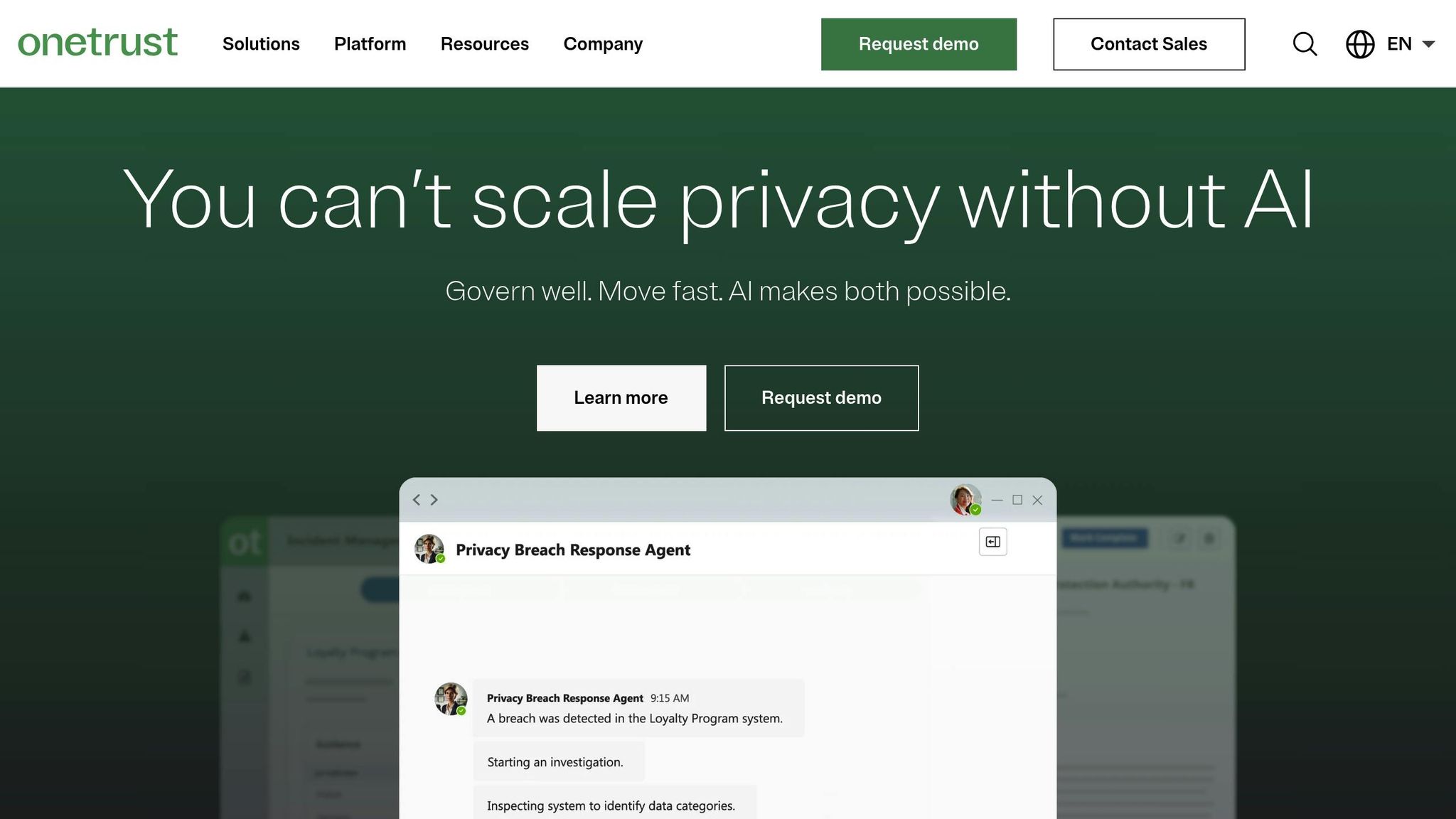
Wrapping up our review, OneTrust stands out as a powerful platform for enterprise-level privacy compliance, leveraging advanced automation and integrations. Processing over 450 million consent transactions daily and supporting 165+ integrations along with 500+ APIs, OneTrust is designed for large organizations looking to manage privacy at scale. While its features are extensive, the implementation process can be complex, reflecting the platform’s focus on delivering comprehensive privacy solutions.
GDPR and CCPA Compliance
OneTrust offers specialized modules to address the requirements of GDPR and CCPA. For CCPA compliance, the platform handles every step of consumer rights requests. This includes intake, identity verification, data discovery, deletion, and secure responses. Additionally, it automates the creation of "Do Not Sell My Personal Information" links across websites, mobile apps, and connected TV platforms. It also centralizes resources like legal texts, guides, and amendment trackers for easy access.
For GDPR, OneTrust automates privacy impact assessments for high-risk data processing activities. As an official Europrivacy technology partner, it assists organizations in demonstrating compliance through detailed data mapping of IT systems, business processes, and third-party relationships.
"OneTrust provides you with a way to minimize risk of non-compliance by leveraging automation and a centralized regulatory knowledge base so you can stay up-to-date and compliant, shorten data processing time and quickly fulfill consumer data requests, and maintain data accuracy across web, mobile, and CTV platforms." – OneTrust
Given the financial risks associated with non-compliance – GDPR fines can reach up to €10 million or 2% of annual revenue – OneTrust’s automated tools are invaluable. They help organizations maintain visibility into privacy incidents and ensure audit-ready documentation.
User Consent Tracking and Audit Logs
OneTrust’s Universal Consent and Preference Management platform handles an impressive 3 billion consent transactions each week. It scales effortlessly to manage millions of daily transactions while maintaining detailed audit logs. These logs track who provided consent, when it was given, and the information they received. The platform also generates consent receipts and maintains an audit-ready database, ensuring compliance with regulations like GDPR and CCPA. This unified system provides a clear view of audience consent choices across the entire customer journey.
"OneTrust is one of the leaders in the market. When we did our assessment, we wanted to have one single application across all the business functions and all the countries that we operate in. This is important to us because, in terms of consent management, we want to have consistency across all our websites and apps." – Octavio Ponce, Strategic Customer Engagement and Marketing Director, Carrefour Group
Integration with Tech Stacks
OneTrust integrates seamlessly with existing technology stacks, offering pre-built applications, APIs, SDKs, data feeds, and system integration options. Its low-code Integrations Platform enables organizations to extend the platform’s capabilities, connect with third-party systems, and automate tasks without requiring significant development resources. Native integrations with major platforms like Salesforce, ServiceNow, and Microsoft Dynamics are available, along with custom integration options using APIs. The platform also supports Swagger and OpenAPI for tailored connectivity.
Examples of integrations include Adobe Experience Platform for ingesting consent data, HubSpot and Mailchimp for marketing automation, and Slack for team notifications. It also connects with compliance tools like Microsoft Purview for data mapping and Ironclad for managing contract workflows.
While OneTrust excels in regulatory research and response management, some users report that the integration process can be challenging. However, its versatile integration options make it a strong choice for organizations aiming to build a privacy-first data strategy.
Pricing begins at $827 per month for Consent & Preference Essentials, $2,275 per month for GDPR compliance, and $1,125 per month for CCPA compliance. Overall costs typically range between $10,000 and $20,000.
Tool Comparison Table
Picking the right privacy-compliant analytics tool means weighing features, coverage, and cost. Below is a comparison of seven tools based on key criteria to help you decide what fits your needs best.
| Tool | Compliance Coverage | Consent Management | Key Integrations | Automation Features | Starting Price |
|---|---|---|---|---|---|
| Ketch | GDPR, CCPA | Built-in consent banners and preference centers | Salesforce, HubSpot, Adobe Experience Platform | Automated data discovery and mapping | $150/month |
| Microsoft Purview | GDPR, CCPA, HIPAA, SOX | Basic consent tracking via integration | Native Microsoft 365, Azure, Power BI | AI-powered data classification and risk assessment | Included with Microsoft 365 E5 |
| Amazon Macie | GDPR, CCPA, HIPAA | – | AWS services, S3, CloudTrail | Machine learning for sensitive data discovery | $1.00 per GB processed |
| Securiti AI | GDPR, CCPA, LGPD, PIPEDA | Advanced consent orchestration | Snowflake, Databricks, ServiceNow | AI-driven privacy impact assessments | Custom enterprise pricing |
| DataGrail | GDPR, CCPA, LGPD | Consent preference management | Slack, Jira, Salesforce | Automated data subject request fulfillment | Custom pricing |
| Osano | GDPR, CCPA, LGPD | Cookie consent banners and management | Google Tag Manager, WordPress | Automated cookie scanning and categorization | $199/month (Plus plan) |
| OneTrust | GDPR, CCPA, LGPD, PIPEDA | Universal consent platform | Extensive integration support | Automated privacy impact assessments | Custom enterprise pricing |
This table showcases how these tools differ in compliance features, integrations, and pricing, helping you pinpoint the best fit for your organization.
Key Takeaways
- Pricing Models: Costs vary widely. Amazon Macie uses a pay-per-use model at $1.00 per GB processed, while others like Ketch and Osano offer fixed monthly plans. Custom enterprise pricing is common for tools like Securiti AI and DataGrail.
- Compliance Coverage: All tools support GDPR and CCPA. If your organization operates globally, tools like OneTrust and Securiti AI, which include LGPD and PIPEDA, might be more suitable. This is increasingly relevant as over 20 U.S. states are expected to adopt privacy laws similar to GDPR and CCPA by 2025.
- Consent Management: The complexity of consent management differs. For example, OneTrust provides a robust, universal consent platform, while Osano focuses on cookie consent management.
- Integration Options: Some tools, like Microsoft Purview, integrate seamlessly into native ecosystems (e.g., Microsoft 365), while others like OneTrust offer extensive third-party integration support. Choosing a tool compatible with your current tech stack can save time and resources.
- Automation Features: Tools like Securiti AI and Amazon Macie stand out for their AI-driven capabilities, while OneTrust emphasizes workflow automation to streamline privacy operations. Automation is particularly valuable for handling large-scale data compliance tasks.
Keep in mind that enterprise implementations might involve extra costs for integration, training, and ongoing support, so factor these into your decision-making process.
Conclusion
Selecting the right privacy-compliant analytics tool is about more than just meeting regulatory requirements – it’s a step toward sustainable growth. With projections showing that 75% of the global population will be under privacy regulations by 2024, businesses can no longer afford to treat compliance as an afterthought.
The numbers speak for themselves. For every $100 invested in privacy, companies see a return of $180. On the flip side, the average cost of a data breach is nearly $4.5 million, with an additional $220,000 tacked on for non-compliance. These figures highlight that privacy compliance is not just a legal necessity but a critical business strategy.
"Compliance and privacy regulations are more than just boxes to tick – they’re integral to building trust and achieving sustainable success." – Ben Daley-Gage, Senior Privacy Consultant, DataGuard
To align compliance with your business goals, start by evaluating your data lifecycle to pinpoint potential gaps. Depending on your needs, you might require a comprehensive solution like OneTrust for consent management or a more targeted tool like Osano for cookie management.
When choosing a tool, focus on integration and scalability. Look for solutions that connect seamlessly with your existing systems. For instance, Microsoft Purview offers native integration with Microsoft 365, while OneTrust supports a wide range of third-party platforms. Also, ensure the tool can adapt to increasing data volumes and complexity as your business grows.
The competitive landscape is shifting rapidly toward privacy-first business models. Companies that prioritize ethical and transparent data practices are setting themselves apart from competitors that overlook user privacy. With 5.7% of tech firms still lacking privacy tools, early adopters have a chance to gain a competitive edge.
"Tech teams today are balancing innovation with responsibility. They want to appear in AI searches, but not at the cost of user privacy." – TechBehemoths analyst
When making your decision, consider the regulations you must comply with, your technical requirements, and your budget. Whether you choose a pay-as-you-go model like Amazon Macie or a more robust enterprise solution such as Securiti AI, the key is to act now rather than waiting for regulatory pressures to dictate your next steps.
Privacy compliance isn’t just about avoiding risks – it’s about building trust and ensuring your business thrives in the long run. The tools discussed here offer a range of options to help you achieve these goals.
FAQs
How do analytics tools comply with privacy laws like GDPR and CCPA?
Analytics tools that prioritize privacy stick to strict guidelines to comply with regulations like GDPR and CCPA. They focus on reducing the collection of personal data, anonymizing user details (like IP addresses), and offering straightforward ways for users to give consent. This approach ensures businesses can gain insights without putting user privacy at risk.
Some key practices include limiting how long data is stored, using secure methods to protect it, and being transparent about how the information is gathered and used. By following these steps, businesses can respect user privacy while staying on the right side of the law.
What should businesses look for in a privacy-compliant analytics tool?
When choosing an analytics tool that respects privacy regulations, businesses should focus on tools that comply with laws like GDPR and CCPA. It’s important to consider where user data is stored, whether the tool offers anonymous tracking, and how seamlessly it integrates with your current systems.
You’ll also want to ensure the tool includes features like data encryption, access controls, and clear consent management to protect user privacy. The best tools strike a balance, offering meaningful insights while safeguarding sensitive information, so you can stay compliant and make informed decisions.
How do these analytics tools ensure compliance with privacy laws like GDPR and CCPA?
These tools aim to make it easier for businesses to navigate privacy regulations by streamlining how they handle user consent and data-related requests. They typically offer features like collecting explicit consent, ensuring clarity about how data is used, and giving users the ability to access, update, or delete their personal information.
A key benefit is their ability to automate Data Subject Access Requests (DSARs), simplifying the process for users to exercise their rights under regulations such as GDPR and CCPA. By managing these tasks efficiently, these tools not only help businesses uphold user privacy but also ensure compliance with ever-changing legal standards.




